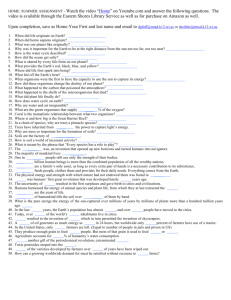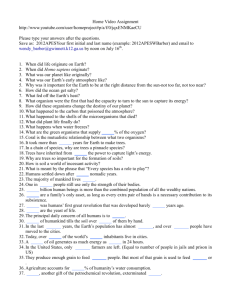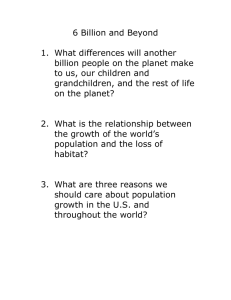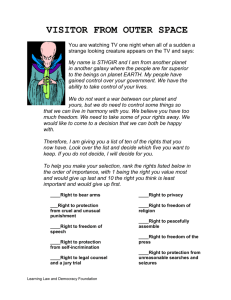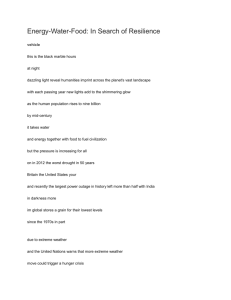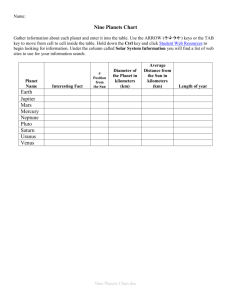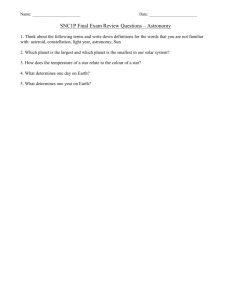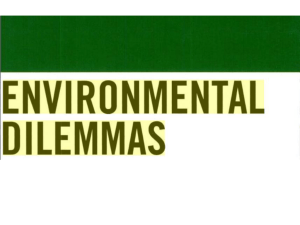Name AP Environmental Science Summer Assignment (Rose
advertisement
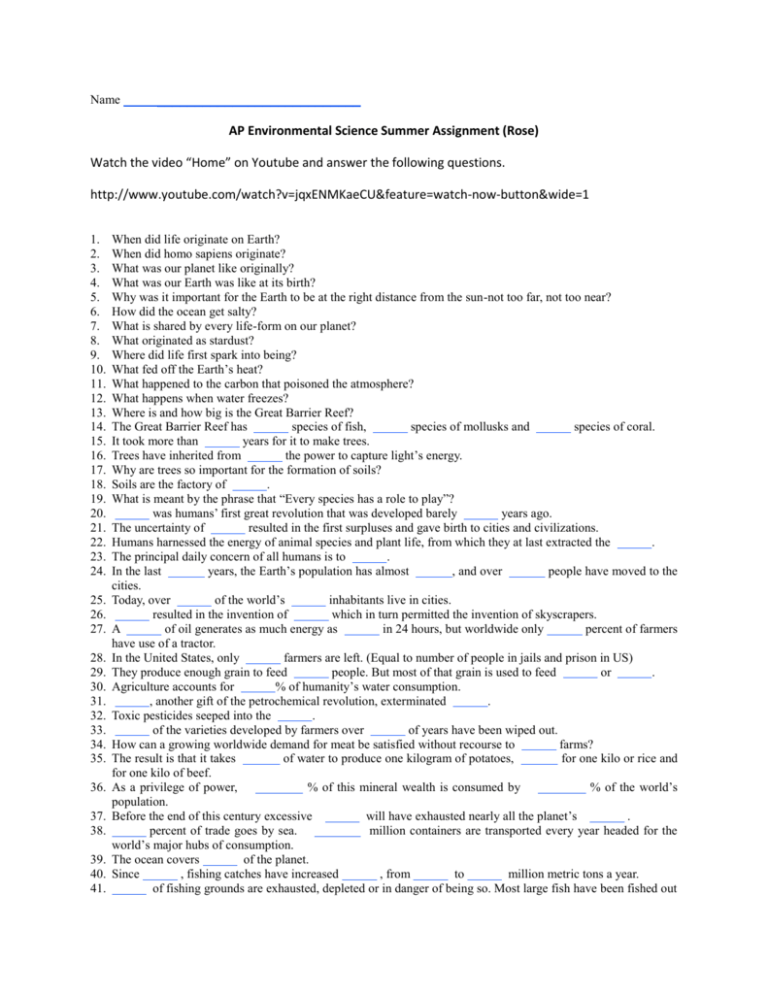
Name ___________________________ AP Environmental Science Summer Assignment (Rose) Watch the video “Home” on Youtube and answer the following questions. http://www.youtube.com/watch?v=jqxENMKaeCU&feature=watch-now-button&wide=1 1. 2. 3. 4. 5. 6. 7. 8. 9. 10. 11. 12. 13. 14. 15. 16. 17. 18. 19. 20. 21. 22. 23. 24. 25. 26. 27. 28. 29. 30. 31. 32. 33. 34. 35. 36. 37. 38. 39. 40. 41. When did life originate on Earth? When did homo sapiens originate? What was our planet like originally? What was our Earth was like at its birth? Why was it important for the Earth to be at the right distance from the sun-not too far, not too near? How did the ocean get salty? What is shared by every life-form on our planet? What originated as stardust? Where did life first spark into being? What fed off the Earth’s heat? What happened to the carbon that poisoned the atmosphere? What happens when water freezes? Where is and how big is the Great Barrier Reef? The Great Barrier Reef has species of fish, species of mollusks and species of coral. It took more than years for it to make trees. Trees have inherited from the power to capture light’s energy. Why are trees so important for the formation of soils? Soils are the factory of . What is meant by the phrase that “Every species has a role to play”? was humans’ first great revolution that was developed barely years ago. The uncertainty of resulted in the first surpluses and gave birth to cities and civilizations. Humans harnessed the energy of animal species and plant life, from which they at last extracted the . The principal daily concern of all humans is to . In the last years, the Earth’s population has almost , and over people have moved to the cities. Today, over of the world’s inhabitants live in cities. resulted in the invention of which in turn permitted the invention of skyscrapers. A of oil generates as much energy as in 24 hours, but worldwide only percent of farmers have use of a tractor. In the United States, only farmers are left. (Equal to number of people in jails and prison in US) They produce enough grain to feed people. But most of that grain is used to feed or . Agriculture accounts for % of humanity’s water consumption. , another gift of the petrochemical revolution, exterminated . Toxic pesticides seeped into the . of the varieties developed by farmers over of years have been wiped out. How can a growing worldwide demand for meat be satisfied without recourse to farms? The result is that it takes of water to produce one kilogram of potatoes, for one kilo or rice and for one kilo of beef. As a privilege of power, % of this mineral wealth is consumed by % of the world’s population. Before the end of this century excessive will have exhausted nearly all the planet’s . percent of trade goes by sea. million containers are transported every year headed for the world’s major hubs of consumption. The ocean covers of the planet. Since , fishing catches have increased , from to million metric tons a year. of fishing grounds are exhausted, depleted or in danger of being so. Most large fish have been fished out 42. 43. 44. 45. 46. 47. 48. 49. 50. 51. 52. 53. 54. 55. 56. 57. 58. 59. 60. 61. 62. 63. 64. 65. 66. 67. 68. 69. 70. 71. 72. 73. 74. 75. of existence since they have no time to . Fish is the staple diet of one in five humans. humans live in the world’s desert lands, more than the combined population of . Across the planet, one major river in no longer flows into the sea for several months of the year. Water shortages could affect nearly people before . These wetlands are crucial to all life on Earth. They represent percent of the planet. What are wetlands? Trees provide a habitat for of the planet’s biodiversity-that is to say, of all life on Earth. Every year, Why is this biodiversity important? What are mangrove forests and why are they important? Every year, hectares of tropical forests disappear in smoke and as lumber. How long did it take Borneo’s vast primary forest to totally disappear? Over people-almost a of the world’s population-still depend on charcoal for cooking and heating. On the hills of Haiti, only percent of the forests are left. What is the story of the Rapa Nui, the inhabitants of the Easter Island? In years, the gap between rich and poor has grown wider than ever. Today, of the world’s wealth is in the hands of the richest percent of the population. One human being in now lives in a precarious, unhealthy, overpopulated environment, without access to daily necessities, such as water, sanitation or electricity. Hunger is spreading once more. It affects nearly people. It’s all about carbon. Under the effect of global warming, the ice cap has lost % of its thickness in years. Its surface area in the summer shrinks year by year. It could disappear before . By ,a of the Earth’s species could be threatened with extinction. Around the North Pole, the ice cap has lost % of its surface area in years. Greenland’s ice contains % of the freshwater of the whole planet. When it melts, sea levels will rise by nearly meters. Sea levels are rising. Water expanding as it gets warmer caused, in the 20th century alone, a rise of centimeters. Coral reefs, for example, are extremely sensitive to the slightest change in water temperature. percent have disappeared. of the biggest cities stand on a coastline or river estuary. As the seas rise, salt will invade the water table, depriving inhabitants of drinking water. Droughts are occurring all over the planet. In Australia, of farmland is already affected. The permafrost is the ground that is constantly frozen. What will happen when it melts? people a day die because of dirty drinking water people have no access to safe drinking water % of arable land has suffered long-term damage Every year, hectares of forest disappear One mammal in , one bird in , one amphibian in are threatened with extinction Species are dying out at a rhythm times faster than the natural rate of fishing grounds are exhausted, depleted or in dangerous decline The average temperature of the last years have been the highest ever recorded The ice cap is % thinner than years ago There may be at least climate refugees by 2050 % of the energy we consume comes from fossil energy sources. Every week, new coal-fired generating plants are built in alone.
